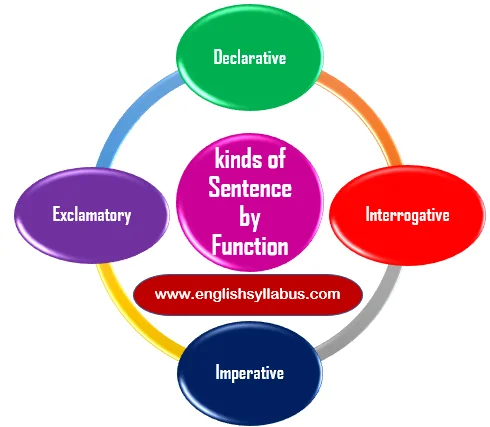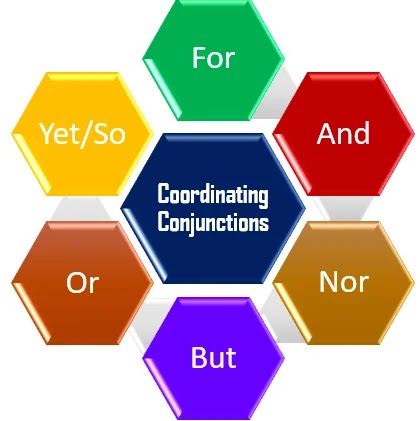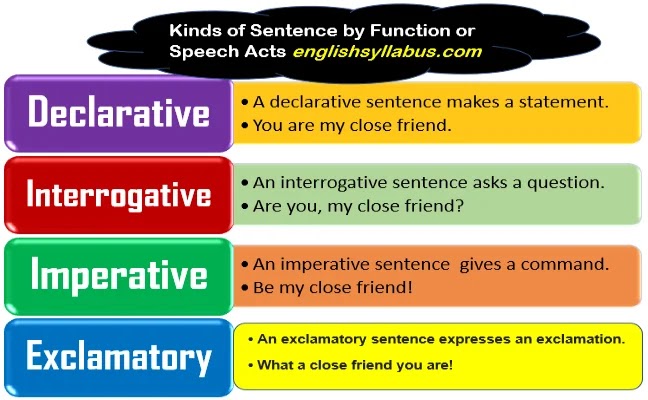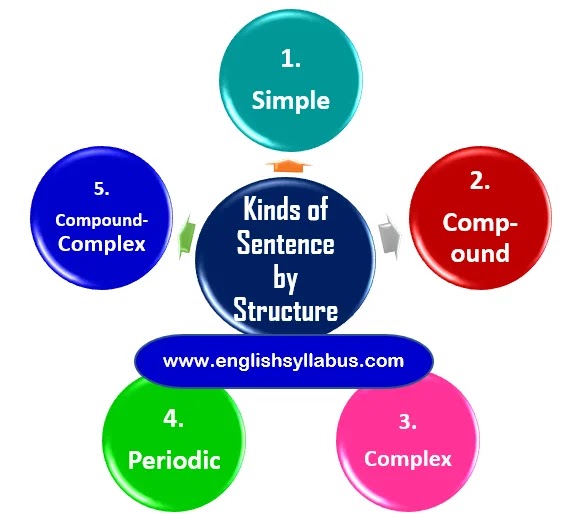Kinds of Sentences by Function

- Declarative
- Interrogative
- Imperative
- Exclamatory
Declarative Sentences
Declarative sentences make a statement. It declares fact or argument-based information about something. And it ends with a full stop. For example:
- There are one hundred people at risk.
- My friend lives in Lahore.
- Islamabad is the capital of Pakistan.
Interrogative Sentences
An interrogative is a kind of sentence that asks a question directly. It ends with the question mark (?).
- Where do you live?
- Can you find my wallet?
- Have you found my phone there?
Imperative Sentences
An imperative is a type of sentence that gives a command directly or a polite request. Because It either ends with an exclamation mark (!) or with a period. It depends on the nature of the sentence. The subject is commonly ignored and is understood to be you. For example:
- Please fetch a glass of milk for me!
- Bring a glass of milk for me.
- Kindly wash your hands first!
- Wash your hands first of all.
Exclamatory Sentences
An exclamatory is a kind of sentence that expresses sudden feelings of excitement or strong emotion. It ends with the mark of exclamation (!).
- Ouch! You have lost the money!
- Wow! You are the winner!
- Yes! That’s a beautiful park!
- Hurrah! My students are the toppers!
Kinds of Sentences by Structure
- Simple
- Compound
- Complex
- Periodic
- Compound-Complex
Simple Sentences
Simple sentences have only one subject and one predicate. It consists of a single independent clause. That’s why We call it ‘independent’ it can stand by itself as a complete sentence.
A simple sentence contains most of the basic features which qualify it as a sentence. A subject, a verb, and a complete thought are part of a sentence. For example:
- My aim in life is to be independent.
- Laura is waiting for the rail.
- He bought a car: (“He”- subject, “bought”-verb)
Compound Sentences
A Compound Sentence has at least two or more independent clauses connected with a coordinating conjunction. OR, A Compound sentence is made up of two or more Independent or Main Clauses. For Example:
- He could not perform well in the exam, but his younger brother stood first.
- My father kept a cow, so we could get pure milk.
The two parts of each sentence have been joined by the Co-ordinating Conjunction=but, so.
- Each part contains a Subject and a Predicate of its own.
- Each part is what we call the Main Clause.
We can memorize Coordinating conjunction by the acronym “FANBOYS”.
These are 7:
- for
- and
- nor
- but
- or
- yet
- so

Complex Sentences
A Complex is the third kind of sentence structure. It contains an independent clause and at least one or two Dependent / Subordinating clauses.
A Dependent Clause is like an independent clause or a complete sentence. But it can’t stand alone like a complete one.
Dependent Clauses
- Because Anas and Joe arrived at the Metro station before noon
- While they waited for me at the bus station
- After she left in the van
The Dependent clauses cannot stand alone as an independent statement. But we need to add one or more independent clauses to make it complex.
Subordinating Conjunctions:
| After | although | as | because |
| Before | even though | if | since |
| Though | unless | until | when |
| Whenever | whereas | while | wherever |
Complex sentences are more effective than compound sentences. Because a complex sentence maintains a clear relationship between the chief parts of the sentence.
- The word ‘before’, for instance, tells the reader that one thing takes place before another.
- The word ‘although’, gives a more complex relationship than a word such as ‘and’ conveys.
Periodic Sentences
Periodic is the fourth kind of complex sentence structure. It starts with a dependent clause and ends with an independent clause.
“While he waited for me at the train station, Joy realized that the train had got late.”
These sentences can be effective because the complete thought appears at the end. So we can develop the first part of it to the meaning that comes at the end.
Compound-Complex Sentences
A Compound-Complex is the fifth kind of sentence structure. It has two or more independent clauses and at least one dependent clause. It connects the compound and the complex sentences.
- The “compound” part indicates that it owns two or more complete sentences.
- The “complex” part means that it possesses at least one more incomplete sentence.
*His grey eyes were light, bright, and sparkling behind half-lined spectacles, and his nose was very lengthy and crooked, as though it had been broken at least twice.



Excellent Content! Thanks a lot!
Hello sir good
It is so much and a very good website!
Thanks!